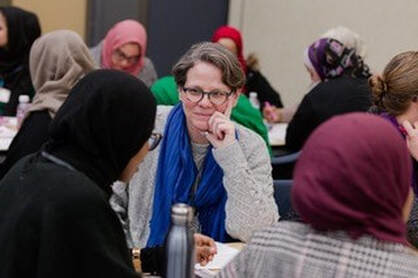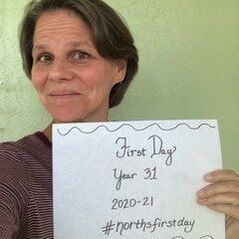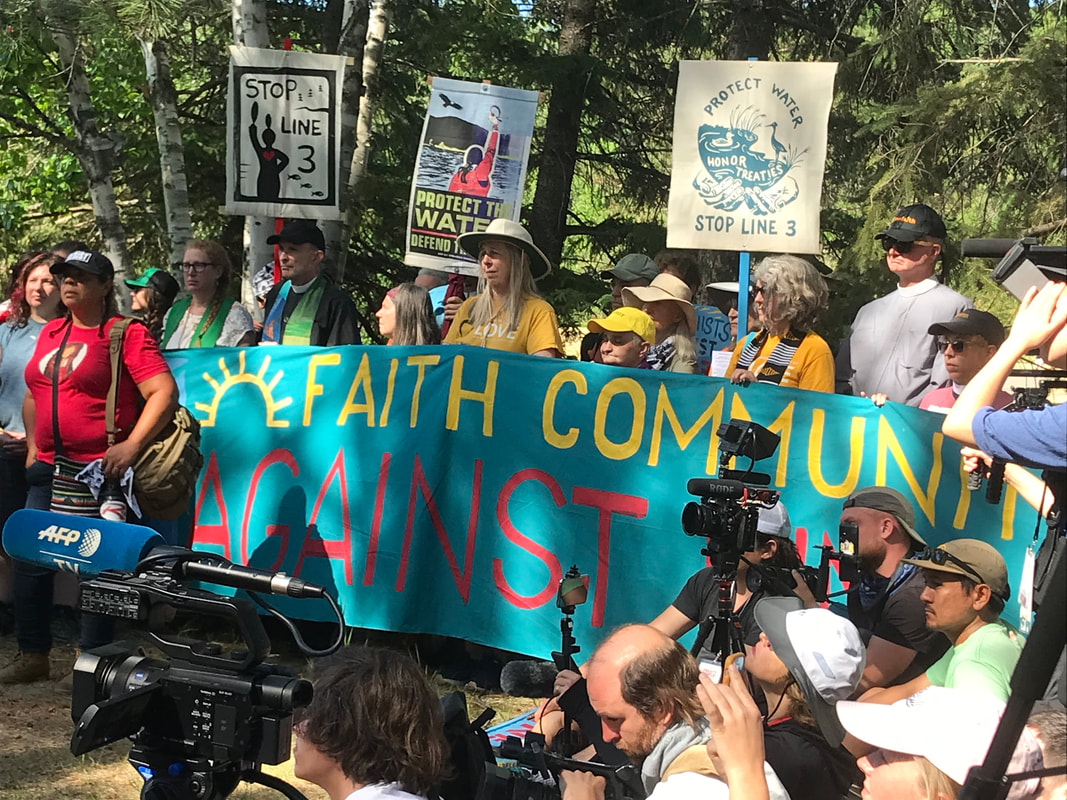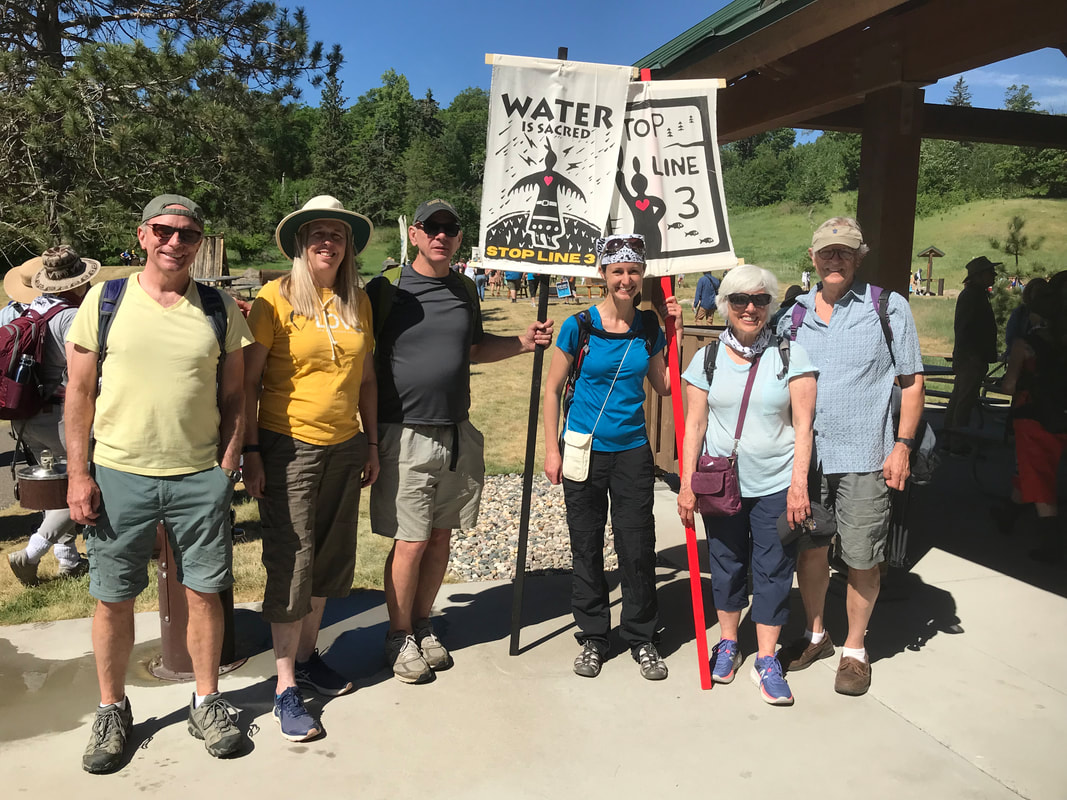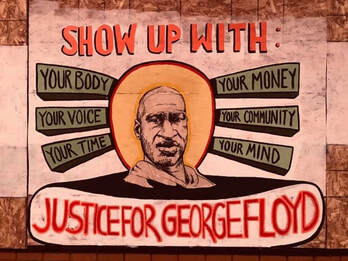 Wednesday, September 22 7:00-8:30 p.m. • Zoom (online) Register: https://bit.ly/ALPSep22 What does it take to be racially literate and engaged in antiracism in a day-to-day way? Where do we find resources and support in our ongoing learning about systemic racism and the work of dismantling it? Whether you attended previous sessions or are just checking it out now, this program is an easy entry into finding antiracism books, podcasts, and videos, as well as discussion partners for talking about them. Come to choose a resource, sign up for a buddy or small group, and receive discussion guidelines. This program is part of Unity's Finding Our Next Right Action efforts. Questions? Contact Becky Gonzalez-Campoy at [email protected].
0 Comments
Angela Wilcox, Beloved Community Staff Team When I was fourteen, my mother insisted that I take an “Assertiveness Training” course offered by my high school during J-term and taught by a psychologist who was a family friend. The very thought terrified me, but the great irony was that my inability to assert myself to oppose this idea meant I spent a week of January learning how to do all the things I thought I couldn’t do: make a cold phone call to ask for information; return an item of clothing; and hardest of all, enter a space where I didn’t know a single person. This week was one of the most significant in my education because of what it taught me about being human in community; Dr. Warloski gave me permission to feel uncomfortable and do the thing anyway. Her goal was to help us feel the truth that discomfort would not kill us, and that often, our paralyzing fears dissipated once we stepped over the boundary and realized that we were not alone — not in our fears, but also not in our values, beliefs, and wonder. My high school was parochial in all senses; I felt a suffocating need to get away from the sameness of that world. In college, I was surrounded by smart, curious people from all over the world. United by our academic drive and our willingness to live through Minnesota winters, we were rich in diversity of experiences, opinions, and dreams. We reveled in unveiling the quirky regionalisms that shaped us and the ways we spoke, played, and understood the world. I became aware of parts of my identity that had been hidden from me because they were so ubiquitous back home. In this temporary and carefully curated educational community, we took the time to explore our differences and share our stories. In graduate school, I gravitated toward courses and social groups filled with international students. I married one of them, we traveled the world together, and I embraced the feeling that I had finally stretched beyond the sameness of my hometown and into the world. After a decade of marriage and a divorce, what I longed for most was a spiritual home where I belonged — someplace where the values and the people felt familiar. From the first Sunday at Unity Church, everything from the religious education program to the music to the flow of the service made me feel like I was home again. And yet, Unity felt like the church of my future, where I had much in common with others, and could raise my children and myself in this new version of my life. I worked in a junior high classroom rich with diversity of all kinds — age, race, culture, language, nationality, ability, and more. As I tried to connect to my students authentically across our many differences, I was often uncomfortable, and these youth invited and pushed me into spaces that stretched me even further into discomfort. I knew from experience that discomfort wouldn’t kill me, but I learned that it takes ongoing practice to stretch and remain humble enough to stop focusing on my discomfort and start listening. Unity has helped me build and sustain those essential ongoing practices. One of my favorite “stretch” experiences has been attending the annual RISE (Reviving the Islamic Sisterhood for Empowerment) conference with some of my Muslim students. During a panel discussion of professional Muslim women, one of my students pulled me aside with tears in her eyes; she’d never met an adult Muslim woman with a career and didn’t know that could be a possibility for her. I’d been so focused on the idea of helping these young women experience a place with other women like them that it hadn’t occurred to me how enormously diverse this gathering would be and what the power of that diversity might be for my students. Where was I missing that diversity in my own life, in spaces that I thought of as being “just a lot of people like me?” Here at Unity, we have expressed our longing to be a multicultural spiritual home grounded in racial healing. What if the way we start is by asking what stories, backgrounds, perspectives, and beliefs we might have missed because so many of us share more obvious identity traits? What if our particular, specific identity is our superpower? That work, along with cultivating ongoing spiritual practices that help us remain humble and resilient in the face of discomfort, might help us live our way into that longing in unexpected and world-altering ways.
Learn more about RISE on their website: www.revivingsisterhood.org. By Jean Hammink On June 5-8, 2021, indigenous leaders in northern Minnesota called treaty people everywhere to gather on the White Earth Reservation to convince President Biden to honor treaty rights and stop the Enbridge Line 3 pipeline. Over 2,000 people from around the country answered the call and showed up for the four-day Treaty People Gathering. The term “treaty people '' was intentionally used to remind us that as citizens of the United States, we all have a responsibility to uphold the treaties our government has made. The pipeline will run through the treaty lands of four Anishinaabe tribes (White Earth, Red Lake, Leech Lake, Fond du Lac). Indigenous leaders organized this gathering after failing to stop the construction after seven years of legal battles and months of on-the-ground protest. To make a bold statement, the event enabled participants to engage in different levels of “direct action,” meaning acts of civil disobedience to delay or shut down construction, like blocking access to the construction site and getting onto construction equipment. The Stop Line 3 Campaign to Protect Treaties, Water and Climate became a priority for Unity’s Act for the Earth (AFE) community outreach ministry team in January 2020. The Treaty People Gathering called the AFE team to a higher level of commitment and action based on our commitment to “advance justice, wholeness, and equity for people, our Earth, and all life on it,” a Unity Ends Statement. Twelve people from Unity Church, ages 23-80, responded by attending the Treaty People Gathering. Claire Cooke was one of those people and she shares her reflections in the piece below. Photos by Jean Hammink Line Three – Let Us Have Hope
A Reflection from the Treaty People Gathering by Claire Cooke That day, the sun beat down hot. The sky was blue. Voices rose in chant, and song, and prayer. There was power, solidarity, and hope by the river. Let me back up and tell you where I was. On the beautiful, sunny morning of Monday, June 7, 2021, I stood on a bridge just above the Mississippi River in northern Minnesota as part of the Treaty People Gathering. This gathering was a direct action organized by indigenous women leaders who have been fighting on the front lines to protect treaty rights and the water. There, not far from the headwaters, the thin band of water below us could hardly be recognized as the rushing river it would become only a couple hundred miles south. But it was beautiful, clean, and slated to be crossed by Canadian oil company Enbridge's tar sands pipeline, Line 3. Line 3 is a “replacement” pipeline project that stretches across Canada, Minnesota, North Dakota, and Wisconsin, with 337 new miles of pipe destined for Minnesota alone. It is a pipeline that threatens over 200 bodies of water and their ecosystems, with its 20 river crossings. A pipeline that would slow our transition to renewable energy and worsen climate change, creating the greenhouse gas equivalent of 50 new coal power plants. A pipeline that violates treaty rights, and will result in more missing and murdered indigenous women. A pipeline that would leave the old pipeline that it is “replacing” to rot in the ground. That day, I, along with 12 other individuals from Unity Church–Unitarian and over 2,000 others, stood united against Line 3 as treaty people. In the United States, treaties, in conjunction with federal law and the constitution, make up the “supreme law of the land.” In the process of becoming a nation, the U.S. entered into many treaties with the native peoples of the Americas to acquire the land where we now live. When such treaties were signed in Minnesota between the U.S. government and the Ojibwe and Dakota peoples, these indigenous peoples retained many of their rights such as the right to hunt, fish, harvest wild rice, and perform spiritual practices on these lands. Over the course of U.S. history, many of these treaty agreements and the rights therein have been, and continue to be, broken. This is true with Line 3, where the pipeline threatens many treaty rights, especially the Ojibwe’s sacred practice of wild rice harvest. Treaty agreements were made between two parties: the ancestors of today's native peoples and the ancestors of many U.S. citizens. We, descendants (whether through a direct bloodline or through the inheritance of this government as U.S. residents) must now collectively honor and uphold these treaties. The Treaty People Gathering showed us that this burden rests not on one party, but on all of us, as we are all treaty people. As we gathered as allies in the days leading up to June 7, we learned about our inheritance of these treaties, about our rights, and our obligations from indigenous leaders. Then, on the 7th, we acted to uphold our end of the treaty, supporting indigenous leaders as they exercised their treaty rights and asking others, including President Biden, to honor these treaties. I have heard many times from those around me that it's hard to be motivated, that the pipeline probably won't be stopped, so there is not really a point in acting. I agree, it is discouraging to see the Minnesota Court of Appeals uphold the Public Utilities Commission’s approval of Line 3, and the Biden administration’s refusal to revoke the federal permits given to the project through the Army Corps of Engineers. Yet, this is where I ask you to have hope. The ability to lose hope, to step away from a fight unimpacted, and the option to walk away at all, are privileges. Those of us unlikely to suffer the consequences are able to lose hope when the fight is long, hard, sad, uncomfortable, inconvenient, or just too time-consuming. Those with privilege have the option to lose hope. On the other hand, the luxury of losing hope isn’t available to those most impacted, those whose way of life is threatened, and those who fear for family and friends. For them, losing hope is so much more than being sad or feeling defeated - it is threatening to their safety, their wellbeing, their way of life. The path of hope, the one that asks us to steadfastly fight the injustice we see in the world, will be a trying path, but it is also the path that Unitarian Universalism asks us to walk down. Luckily this is not a path we are asked to walk alone. We are called together to support one another and hold each other accountable, as we sweat, fumble, and rejoice in this work. Together, let us have hope. To join the Line 3 movement and find out what you can do to help, please visit https://www.stopline3.org/, https://www.mnipl.org/take-action/pipelines/, or contact Act For the Earth’s at [email protected]. |
Topics
All
Beloved Community ResourcesUnity Justice Database
Team Dynamics House of Intersectionality Anti-Racism Resources in the Unity Libraries Collection Creative Writers of Color in Unity Libraries The History of Race Relations and Unity Church, 1850-2005 Archives
July 2024
Beloved Community Staff TeamThe Beloved Community Staff Team (BCST) strengthens and coordinates Unity’s antiracism and multicultural work, and provides opportunities for congregants and the church to grow into greater intercultural competency. We help the congregation ground itself in the understanding of antiracism and multiculturalism as a core part of faith formation. We support Unity’s efforts to expand our collective capacity to imagine and build the Beloved Community. Here, we share the stories of this journey — the struggles, the questions, and the collaborations — both at Unity and in the wider world.
The current members of the Beloved Community Staff Team include Rev. Kathleen Rolenz, Rev. KP Hong, Rev. Lara Cowtan, Drew Danielson, Laura Park, Lia Rivamonte and Angela Wilcox. |
